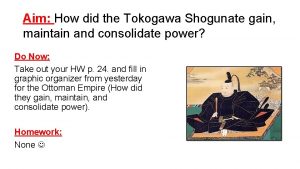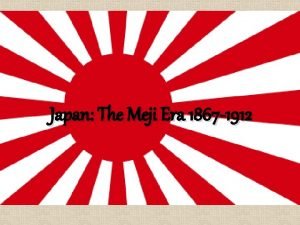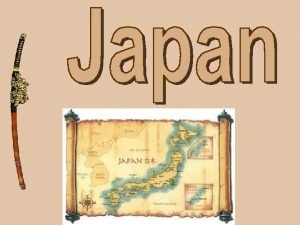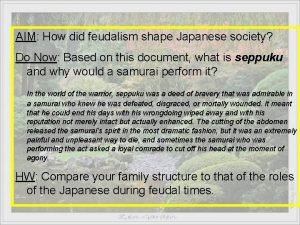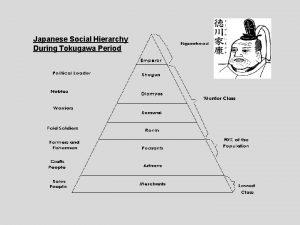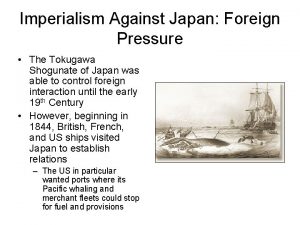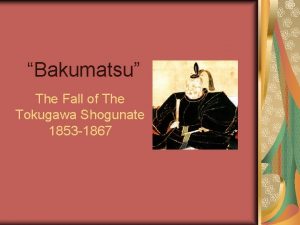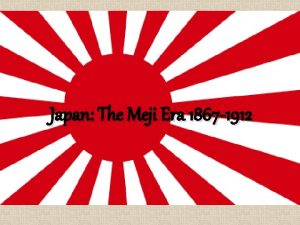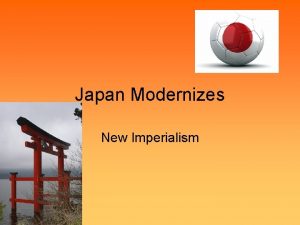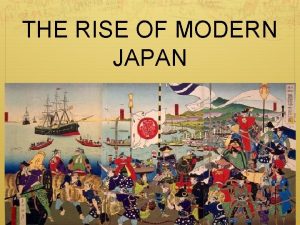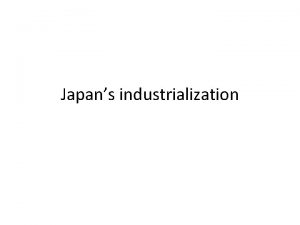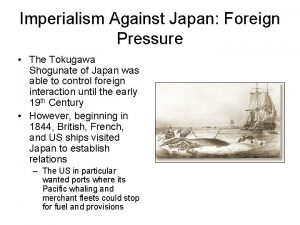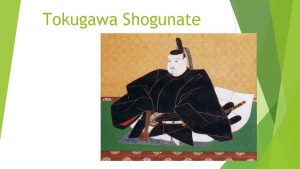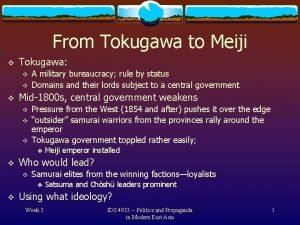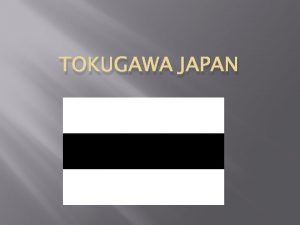Tokugawa Shogunate AIM Is a strong centralized government


















- Slides: 18

Tokugawa Shogunate AIM: Is a strong, centralized government in the best interest of the people?

DO NOW: Read Introduction. Identify – who were the Tokugawa Shogunate Japan was thrown into warfare and chaos after centuries of peace. Many powerful daimyo (lords) constantly battled each other for control of territories. Japan was not united. It was split up into many territories. Then, a powerful daimyo named Tokugawa Ieyasu defeated all his enemies and unified Japan. Now, instead of many territories with many different leaders, the Japanese people had one ruler – the Tokugawa Shogun. This was a strong and central government. The Tokugawa family ruled Japan peacefully for the next 200 years.



DIRECTIONS: Read about the things Tokugawa Shogunate rule did for Japan. 1. Underline/highlight the main idea. 2. Circle words/phrases you do not understand. 3. Place a check ✓ next to statements that will create a positive effect and an X next to those that will have a negative effect. 4. Evaluate whether the changes made under Tokugawa Shogunate had a Positive or Negative Effect.

Tokugawa Ieyasu’s Laws Europeans first came to Japan about 50 years before Tokugawa Ieyasu came to power. Europeans brought strange goods and technology, such as guns and cannons. European missionaries (people who spread Christianity) also introduced Christianity and converted hundreds of Japanese to the new religion. These European influences made Tokugawa Ieyasu very upset. As a result, Tokugawa passed several laws:


Tokugawa Ieyasu’s Laws 1. Japan is a country of many gods, but we have been receiving teachings from Christian countries. This cannot be tolerated (accepted) any more. 2. The missionaries come to people in our town and try to make them followers and let them destroy our Buddhist and Shinto shrines and temples. This is an outrage! 3. Missionaries commit the illegal act of destroying the holy books of Buddha. They will not be allowed to stay in Japan.

Tokugawa Ieyasu’s Laws will have a positive/negative effect on the people because…. .

The Close Country Policy Europeans who visited Japan brought positive and negative influences. They brought goods and technology to the Japanese, which were helpful to the military leaders of Japan. However, European priests introduced Christianity and converted hundreds of Japanese to this new religion. These European influences made Tokugawa Ieyasu very upset. He then banned Christianity from Japan. He ordered to hunt down and kill or deport Christian missionaries. This resulted in passing the Close Country Policy:

The Close Country Policy 1. Japanese ships are not allowed to leave foreign countries. 2. No Japanese are allowed to go to other countries. If he tries to do so secretly, he must be killed. 3. If there is anyone who teaches Christianity, they will be sent to jail. 4. All ships coming into Japan must be thoroughly searched for Christians. 5. All foreign countries are not allowed to enter or trade in Japan.

Treatment of Christians As foreigners began trying to trade with Japan, Shogun Tokugawa was alarmed by reports that the Spanish has conquered (took over) an island in the Philippines. Shogun Tokugawa decided to keep people from other countries out of Japan because he was afraid that Christian missionaries would plan with the Japanese Christians to overthrow him. Tokugawa banned (did not allow) Christianity in Japan. Over the next 20 years, Tokugawa officials rounded up Christians and tortured and executed them.

Alternate Attendance Policy The Tokugawa moved the capital of Japan from Kyoto to Edo (now called Tokyo) in 1868. Even though the Tokugawa Shogun was in complete control of Japan, there were still powerful lords in charge of territories. To keep feudal lords (daimyos) from rebelling (going against them), Shogun Ieyasu controlled the daimyos by requiring that each lord spend every other year in his city so that he could keep a close eye on them. Tokugawa rulers expected respect, loyalty, and obedience of these lords. When the Daimyo would return to their territory, their families would have to stay behind in Edo as hostages. This became known as the system of “alternate-attendance”.

Theme: Change – Individuals Throughout history, various circumstances have led individuals to develop or modify ideas. These ideas have often affected societies. Task: Select ONE individual from your study of global history • Describe the historical circumstances that led to this individual to develop or modify an idea • Explain how an action taken by this individual as a result of this idea • Discuss how this individual’s idea affected a society You should use Tokugawa Ieyasu

Task Rubric

PARAGRAPH #1: (Describe the historical circumstances that led to this individual)


Conclusion - Discuss Is a strong centralized government in the best interest of the people?
 What hardships did daimyo face during the tokugawa period?
What hardships did daimyo face during the tokugawa period? Be strong be strong be strong in the lord
Be strong be strong be strong in the lord Emperor shogun daimyo samurai peasants
Emperor shogun daimyo samurai peasants What is north of mesopotamia
What is north of mesopotamia Japanese hierarchy
Japanese hierarchy The tokugawa shoguns created an orderly society by
The tokugawa shoguns created an orderly society by Tokugawa japan ap world history
Tokugawa japan ap world history Ieyasu tokugawa
Ieyasu tokugawa Tokugawa social hierarchy
Tokugawa social hierarchy Strong acid titration curve
Strong acid titration curve Weak base strong acid titration curve
Weak base strong acid titration curve Strong acid list
Strong acid list Strong acid and strong base titration curve
Strong acid and strong base titration curve Net ionic equation for strong acid and strong base
Net ionic equation for strong acid and strong base How to remember strong acids and strong bases
How to remember strong acids and strong bases State and federal constitutions
State and federal constitutions Centralizing email communications in cloud computing
Centralizing email communications in cloud computing Methods of drug distribution
Methods of drug distribution Centralized computer system
Centralized computer system
